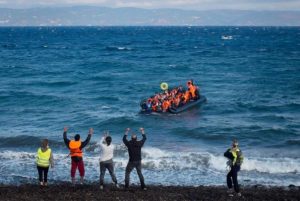EU complicit in war crimes in Libya – UN report
The United Nations has accused the European Union of being complicit in crimes against humanity committed by Libyan forces targeting migrants attempting to reach Europe.
A UN fact-finding mission found “reasonable grounds to believe” was crimes have been committed in Libya.
The mission’s report says EU regulations have forbidden European boats from returning migrants to Libya and that this policy has led to EU states providing funding and technical and logistics support to the Libyan Coast Guard.
 The Libyan Coast Guard and other government entities have been accused of widespread “arbitrary detention, murder, torture, rape, enslavement and enforced disappearance” against migrants since 2016.
The Libyan Coast Guard and other government entities have been accused of widespread “arbitrary detention, murder, torture, rape, enslavement and enforced disappearance” against migrants since 2016.
“Our investigations have established that all parties to the conflicts, including third States, foreign fighters and mercenaries, have violated international humanitarian law, in particular the principles of proportionality and distinction, and some have also committed war crimes,” the chair of the mission Mohamed Auajjar said.
The mission gathered and reviewed hundreds of documents, interviewed more than 150 individuals and conducted investigations in Libya, Tunisia and Italy.
The focus of their work included the conduct of the parties to the armed conflicts that have taken place across Libya since 2016.
The report says violence has had a dramatic impact on Libyans’ economic, social and cultural rights, as evidenced by attacks on hospitals and schools.
“Civilians paid a heavy price during the 2019-2020 hostilities in Tripoli, as well as during other armed confrontations in the country since 2016. Airstrikes have killed dozens of families. The destruction of health-related facilities has impacted access to health care and anti-personnel mines left by mercenaries in residential areas have killed and maimed civilians,” it said.
The mission also examined violations in the context of deprivation of liberty and documented the situation of internally displaced people as well as that of migrants, refugees and asylum-seekers.
“Migrants, asylum-seekers and refugees are subjected to a litany of abuses at sea, in detention centres and at the hands of traffickers,” the report said.
“Our investigations indicate that violations against migrants are committed on a widespread scale by State and non-State actors, with a high level of organization and with the encouragement of the State – all of which is suggestive of crimes against humanity.”
The mission also found evidence of disturbing patterns of violence committed in Libyan prisons, with detainees tortured on a daily basis and their families prevented from visiting.
“Arbitrary detention in secret prisons and unbearable conditions of detention are widely used by the State and militias against anyone perceived to be a threat to their interests or views,” the report said.
“Violence in Libyan prisons is committed on such a scale and with such a level of organization that it may also potentially amount to crimes against humanity,” it said.
Insecurity in Libya has led to the internal displacement of hundreds of thousands of people who have ended up in areas ill-equipped to accommodate large population movements.
Some ethnic groups, such as the Tawerghas, the Tebus and the Alahali, have been displaced since 2011 and continue facing severe abuses, the report says.
It says there is evidence indicating that Libya has failed to take action to ensure the safety of internally displaced persons and their return to their place of origin, in breach of its obligations under international law.
The mission’s report also documents the recruitment and direct participation of children in hostilities, the enforced disappearance and extrajudicial killings of prominent women and continuing sexual and other forms of violence against vulnerable populations, including LGBTQI persons.












